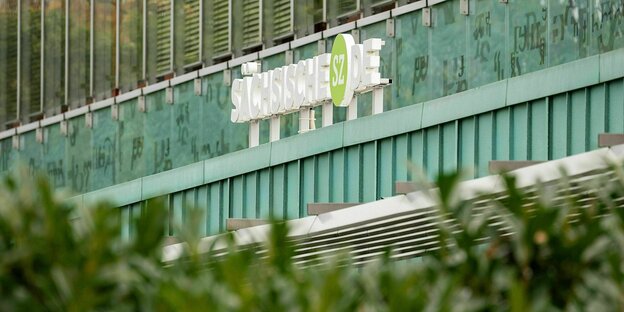Since the publisher Madsack bought the newspaper Sächsische Zeitung, the affected journalists have been in a bad mood. Your future is uncertain.

Madsack takes over the Sächsische Zeitung newspaper. Photo: Robert Michael/Picture Alliance
DRESDEN taz | “Is Madsack destroying his biggest fish or is he giving her space?”, A voice from the editorial team of saxon newspaper (IS) reflects the skeptical but not entirely desperate mood following the sale of its Dresden-based media group DDV to the large Hannover-based Madsack consortium, announced on January 10. In Dresden and the East Saxony region it also affects size and their regional editorial teams too morning post-Tabloids from Dresden and Chemnitz and the online portal Tag24. Until now, the owners were 60 percent RTL and Bertelsmann and 40 percent the SPD press holding company DDVG. The cartel office has yet to agree.
With the current trend towards media monopolies, some people have size-The employees were already expecting a more or less hostile acquisition. The current coup, however, was not leaked and surprised almost everyone.
It seems like an appeal to self-confidence. The former SED organ in the Dresden district survived the sale by the Treuhand in 1991 and remained strong. The printed circulation has fallen to just under 163,000 copies. But the online version saechsische.de, with around 16 million visits per month, is also doing very well in the Madsack empire. It is maintained by an office in Berlin saxon newspaper not anymore, but cooperate with him daily mirror and on advice pages with the Free Press. Otherwise, the newspaper does everything itself and the pride in it is palpable.
Discontinued model
Therefore, the central question is: will the editorial staff maintain the covers in the future “or will they impose the framework on us”? Madsack's editorial network in Germany already supplies covers to around twenty of the group's newspapers. The Saxony regional association of the Association of German Journalists refers to the project also adopted by Madsack Leipziger Volkszeitung. CEO Lars Radau reminds us that the entire editorial office was also dismantled there.
Your branch Latest news from Dresden (DNN) Madsack has long focused on local events, sports and culture. However, the up to three cultural pages are valued by Dresden's educated middle class. Colleagues there want to be asked about future prospects even less than before. Because it is clear to everyone that with this size-Sale to DNN-Owner, the competitive situation in Dresden has disappeared, which gave the newspaper a certain reputation and motivated the editors.
Madsack has it DNN Never at least a serious one. size-Competitors accumulated. Print circulation has decreased by two-thirds since 1998 and currently officially stands at 12,728 copies. The newspaper is desperately struggling to get subscribers with a decent online presence. With substandard rates of about 30 cents per line of print, only a few independent enthusiasts write for the paper. You defend yourself with black humor DNN against the feeling of being a discontinued model.
The poster office decides
That's all size-Not the editors yet. We have no illusions that we can even begin to have a say in the fate of the editor and the newspaper. But fears about the future and concerns about the future quality of newspapers are somewhat tempered by the “experience with regional newspapers” attributed to Madsack. The group's CEO, Thomas Düffert, was also CEO of DDV from 2006 to 2010, i.e. size-Editor. “It could have been worse,” says the editorial when comparing it with other potential buyers.
Things have already gotten bad enough for DJV Sachsen's Lars Radau. “We fear centralization and a reduction in skills and personnel following the example of the Leipziger Volkszeitung.” The DJV has received information that the cartel office sells Madsack newspapers. DNN and General Döbelner as a condition for his approval of the big deal. Just like in Dresden, the previous competition in Döbeln in central Saxony also becomes a reality size-Sheet Döbelner Anzeiger Suddenly a double. “But I don't have the imagination to know who would buy a security in this situation,” says Radau with an ironic tone.
As far as the political background is concerned, it has so far been observed that in Pegida and other mob demonstrations only the editors of the newspaper saxon newspaper They were insulted and threatened by name, never by anyone from the Madsack Empire. Most of the time he was also against the SPD's media power due to its 40 percent share. In Dresden this label no longer exists, but the socialists still maintain a 23.1 percent stake in Madsack through the DDVG.